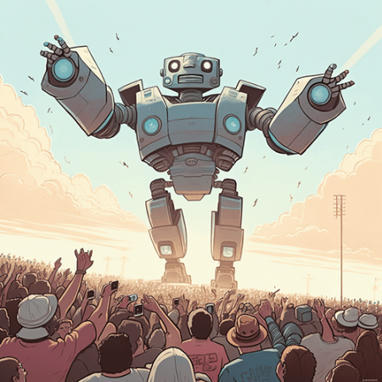
The Singularity, often referred to as the Technological Singularity, is a hypothetical point in the near future at which artificial intelligence (AI) becomes so incredibly advanced that it surpasses human intelligence, leading to rapid, unforeseeable changes in society and technology, life as we know it. The term was popularized by mathematician and computer scientist Vernor Vinge and futurist Ray Kurzweil.
At the Singularity, AI systems would possess the ability to autonomously learn, self-improve, and create new AI systems with very advanced capabilities and more intelligent than themselves, resulting in an exponential increase in intelligence. This self-improvement cycle could lead to AI systems that are vastly more capable and sophisticated than human minds and anything humans can even imagine.
The Singularity is often associated with the development of artificial general intelligence (AGI), which is an AI system that can perform any intellectual task that a human being can do. AGI is distinct from narrow AI, which is designed for specific tasks and lacks the broad cognitive abilities and adaptability of human intelligence.
The implications of the Singularity are the subject of much speculation and debate today. Most people who have thought about it agree that the Singularity would be a decisive turning point in human history. Some view this with awe and trepidation, almost like a religious event that will lead to everlasting life and happiness. Many believe it will bring about tremendous breakthroughs in medicine, energy, and space exploration. Others are more cautious, expressing concerns about the ethical, societal, and existential risks associated with super-intelligent AI systems. Some predict doom and gloom. Others think it is all but impossible.
Predicting the Singularity Start Date
The general caveat to this question given by all experts is that predicting when the Singularity might occur is highly uncertain, as it depends on the pace of AI research, breakthroughs in understanding human cognition, and the development of advanced hardware and software systems. Still, ChatGPT-4 has predicted a 5%-10% chance that the singularity will happen within five years, 2028. Chat GPT-4 did so without knowledge of what has happened since September 2021, when it was last fed data.
We know what has happened since September 2021, we know the pace of change, even though the ChatGPT model does not. We know that when ChatGPT-3.5 was released in November 2022, it scored in the bottom 10% of the multi-state Bar exam. But just five months later, when 4.0 was released in March 2023, it scored in the top 10%. Let that sink in and remember no new data was provided. There was only improvement in reasoning ability. As lawyers who have all taken this test, we know better than anyone the significance of a jump from the bottom to the top 10% of this challenging test. Yes, it is getting pretty smart, fast. How much longer until its intelligence exceeds our own?
Opportunities and Challenges Presented by the Singularity
The three opportunities listed here, all good, are generally thought to be possible in a time of technological Singularity, a time where AI intelligence and capacities accelerate at an exponential rate.
- Accelerated Technological Progress: The Singularity could lead to rapid advancements in various fields, as super-intelligent AI systems develop new technologies and solve complex problems that were previously beyond human reach.
- Economic Growth: With Ai systems handling tasks more efficiently and effectively than humans, productivity and economic growth could increase dramatically, potentially leading to higher standards of living and reduced global inequality.
- Scientific Discoveries: The Singularity might enable breakthroughs in areas such as healthcare, environmental sustainability, and space exploration, as Ai systems analyze vast amounts of data, simulate complex phenomena, and generate innovative solutions to pressing challenges.
Conversely, as usual, their is a flip side to opportunities, the generally accepted challenges, some might say threats, presented by the Singularity:
- Ethical Concerns: As Ai systems surpass human intelligence, ethical considerations become paramount. Ensuring that Ai systems behave ethically, adhere to human values, and respect individual rights will be crucial.
- Job Displacement: The widespread adoption of super-intelligent Ai systems could result in job displacement across various industries, as human workers are replaced by more efficient Ai. This raises concerns about unemployment, workforce retraining, and social safety nets.
- Existential Risks: The Singularity poses potential existential risks, as super-intelligent Ai might act in ways that are harmful to humanity, either intentionally or unintentionally. Ensuring Ai safety and robustness is essential to mitigate these risks.
Read the full article at: e-discoveryteam.com